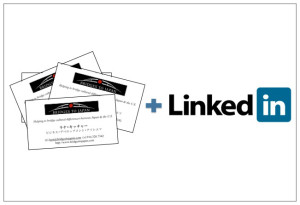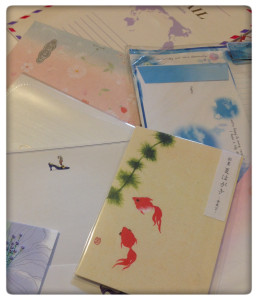Kitcher’s Café, a new series by Lana Kitcher (Yamanashi-ken, 2010-12) is an assortment of articles, topics and commentary written for the JET Alumni community. Lana currently serves as the Business Development Associate at Bridges to Japan, a New York-based cross-cultural consulting firm founded by JET alum Jennifer Jakubowski (Hokkaido, 1995-97).
Dear recent JET returnees and current "job hunters,"
 I was given the opportunity to speak at the JETAANY Career Forum in New York City a few weeks ago. Approximately 25 recent returnees (plus JET alumni going through a career transition) attended the event and were able to learn from the presenters, and also from one another, about how to successfully land a job in today's economy. We learned that it is important to keep strategies current as technology continues to change and as the methods of yesterday are not necessarily effective for our search today.
I was given the opportunity to speak at the JETAANY Career Forum in New York City a few weeks ago. Approximately 25 recent returnees (plus JET alumni going through a career transition) attended the event and were able to learn from the presenters, and also from one another, about how to successfully land a job in today's economy. We learned that it is important to keep strategies current as technology continues to change and as the methods of yesterday are not necessarily effective for our search today.
I would like to share with you some of the points from my presentation called "Making the Most of Your Network," in case some of you are also going through this transition now. When I first returned home from the JET Program I had a really difficult time figuring out how to start the job search. At that point my only full-time job had been teaching English in Japan, and I didn't know how to start looking for a new job from scratch. It took me until mid February to get a job, and I really wish someone had told me what I needed to hear earlier.
I thought I was supposed to be applying to job posts and boards online, giving out my resume, and collecting business cards and LinkedIn contacts. After several weeks of searching and no hits (nope, not one interview), I was starting to feel desperate and under-qualified. I kept hearing from people that they had found their jobs on craigslist, or had applied online and gotten an interview. But this method clearly wasn't working for me, and I needed to change my strategy.
From that point I started doing extensive research, reading books and talking with people. Someone once told me that if I wanted to meet someone, I should invite them to lunch and offer to pay for the meal. (Ever seen an episode of MadMen?) I tried this advice, and started talking to people that I could learn from. It was through these connections that I was actually able to start building a real network, finally turning my hopeless job search into a successful one.
When it comes down to it, people are doing the hiring. Having a good resume is important, but submitting it blindly to hundreds of job postings doesn't mean that anyone will ever actually read it. Why not meet the people who can get to know you? Maybe they will know someone who is hiring and they can recommend you. Maybe they are actually hiring themselves and decide through your pleasant interaction that you would be a good fit for their company. Companies want to hire people they know and trust. Maybe your meeting will lead nowhere (now), but if nothing else it could be a great conversation, or practice for when it will count.
At the presentation, I passed around these resources for participants to use. Please feel free to view or download and print them yourselves if you think they can be helpful to you.
1) Networking Tips Sheet - This has several bullet points of items that I wanted to highlight, or didn't have enough time to cover during the presentation - tips to keep in mind.
2) Networking Resources Reading List - This list includes books that I have read or have had recommended to me regarding networking. It may seem strange to read about job hunting and networking, but in the long run it may be worth the time investment. Most of the resources should be available at your local library if you do not want to purchase a copy.
3) Networking Practice - When meeting new people or attending networking events, it is important to remember information about the people you meet. It is also important to follow up with them afterward. If you note commonalities, it will give you more to connect on later. Consider using a worksheet like this to help keep track of new connections. For some, it may also be helpful to have a "goal" when attending events. I often tell myself that I need to meet at least three people by the end of the event. Since I am shy, this pushes me out of my comfort zone and allows me to strike up new conversations.
4) Making the Most of Your Network PowerPoint - It may not make a lot of sense alone, but I thought I would include it just in case you wanted to take a look.
If you are currently unemployed, I would recommend starting by meeting 2 to 3 people and attending one networking event each week. If you are pressed for money, schedule a few phone calls instead. Using technology such as e-mail, LinkedIn, and internet searches is a great way to start your research process, but the next step is to make those human connections. Find things that you have in common with that person. Do you share interests? How about alumni associations, previous jobs or locations? Do they do what you want to do? Ask them how they got there and what they might do differently if they could do it again. Learn from them and teach them about who you are without having to "sell yourself." They will learn about your experience and personality throughout the duration of the conversation and the relationship. Networking isn't about meeting as many people as you can as quickly as you can, but about creating human connections, and being able to sustain the relationships over time. How can you help them? How can you mutually benefit?
Words to redefine:
Informational Interview = Talking with people about what they do and how they got there. You're there to learn about them or their company.
Elevator Pitch = Knowing who you are and what direction you're thinking about going in. Don't try to fit your life story and qualifications into 30 seconds, but when the point comes and they ask you, "so what are you looking for?" you'll know the answer. There's nothing harder than trying to help someone who doesn't know what they want. Try some of the exercises from the book What Color Is Your Parachute to help you get there.
Networking = Meeting new people and sustaining relationships and connections over time. Teaching and learning, listening, helping, bridging.
So there you have it! If what you're doing isn't working, trying something new. Ask your friends and family what worked for them. I'll leave you with some advice that my friends told me:
- “I met my boss at a meetup.com social event!”
- “I attribute my success to LinkedIn, but not the job boards - just speaking with and reaching out to different people.”
- “I started learning how to network when I stopped calling it “networking” and started calling it “meeting new people.”
- “I found my current position by following the jobs posted on JETwit.”
- “It’s very unlikely that someone will say no to a free meal, and if they say no – well, that’s the worst that could happen.”
If you have any additional hints and tips to share with fellow JET Alumni currently looking for employment, please share your ideas in the comments section below! We look forward from hearing from you and sharing our advice and experiences.
By the way, definitely utilize your JETAA and JETwit networks for your job search! There are new jobs posted weekly either by JETs, or by companies who love to hire JETs. Good luck!

